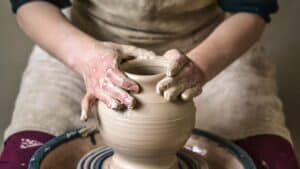Germs are everywhere. That’s just a fact of life. Many people, however, are wary of continuously dumping disinfectants and antibacterial products on their skin.
At the same time though, they, of course, want to remain clean and healthy. Is homemade soap the answer?
Does homemade soap kill germs? Like all plain soaps, homemade soap allows germs to be washed away but does not kill them. Soap is a surfactant that releases dirt and germs from your skin. It also forms micelles that bind with and trap oils allowing them to be rinsed away from skin.
Routinely ridding your body’s largest organ, your skin, of illness-causing germs is critical to your health and well-being, but will a homemade soap truly get the job done?
Let’s take a look at the answer to that question and more.
How Well Does Homemade Soap Cleanse?
It’s important to realize that as long as your homemade soap was formulated and made carefully with the correct ratios of lye to oil, homemade soap is, in every way and by every definition, soap, just like the bars available in stores.
That said, it’s safe to say that a homemade soap will work just as efficiently as any other soap, if not better.
The beauty of homemade soap is that skin-nourishing glycerin remains in the bar and you can customize each batch for desired moisturizing properties.
You see, commercial soaps contain very little glycerin, as it is usually removed and sold for a profit.
Glycerin is a natural humectant, meaning it attracts moisture from the air. In soap, the glycerin helps to moisturize your skin.
Take away the glycerin and you have a soap that tends to dry out your skin instead of nourishing it.
Does Homemade Soap Kill Germs? Is It Antibacterial?
Contrary to what many believe, regular soap, including homemade, does not kill germs; it bonds with them allowing them to be rinsed away down the drain, leaving your skin clean.
As long as the germs are removed from your skin, does it really matter whether they are dead or not? Scientific research indicates the answer is no.
Both the Centers for Disease Control and the Food and Drug Administration maintain that washing your hands with plain soap and water regularly is one of the best ways to avoid becoming sick.
What About Antibacterial Soaps?
Antibacterial soap is designed to kill most bacteria, not necessarily other germs, like viruses, that cause illnesses.
They contain questionable (meaning potentially harmful) ingredients such as benzalkonium chloride.
According to Dr. Janet Woodcock of the FDA, “In fact, some data suggests that antibacterial ingredients may do more harm than good over the long-term.”
How is this possible?
Well, the chemicals that give antibacterial soap bacteria-killing properties will also kill beneficial microorganisms, such as S. epidermidis, normally found on skin.
According to Dermet NZ, these “good guys” are thought to play several important roles.
They:
- Prevent harmful microorganisms from colonizing and adhering to skin.
- Produce antibiotic-like compounds.
- May enhance immune response.
- Stimulate cells to release an antimicrobial peptide.
In addition to destroying beneficial bacteria, antibacterial soaps can also dry out your skin, especially if used often, and in some individuals, they may cause contact dermatitis due to the irritating chemicals.
Because antibacterial soaps don’t kill 100% of the bacteria, many people worry that while the weaker bacteria may be destroyed, the surviving bacteria may develop resistance to antibacterial products over time.
Another similar concern is that the antibacterial soaps may encourage viruses to mutate into stronger forms.
I think I’ll just stick with good old regular soap.
How Does Soap Work?
Without getting too technical, a soap molecule has two parts or ends.
One part mixes easily with water and will bond with most non-greasy particles. The other end bonds readily with oils, fats, and greases.
When soap is mixed with water, it forms micelles which basically trap oil molecules in their center before being washed away.
Soap is also a natural surfactant, meaning it reduces the water’s surface tension, allowing dirt and germs to better interact with the soap and be removed from your hands.
Soap is effective when used with cold water and can handle the naturally occurring oils found on your skin.
However, for extra greasy hands, very warm to hot water will do a better job as the heat will warm and melt the solid oils on your skin so the soap can easily bind with them and leave your hands squeaky clean.
What Exactly Are Germs?
Germs are microbes that fall into four categories: bacteria, viruses, fungi, and protozoa.
They are too small to be seen with the naked eye but are literally everywhere – in our air, soil, water, food, and practically any surface you touch.
Not all “germs” are bad though.
Without beneficial bacteria, our digestive tract would not be able to function normally. Without yeast (a fungus) most of your favorite breads would not exist. Most people’s intestinal tracts contain harmless protozoa.
However, there is no doubt that some germs can make you sick and cause disease. That’s why it is so important to wash your hands often and thoroughly.
Can I Add Antibacterial Properties to Homemade Soap?
Many soap makers choose to add only natural ingredients to their creations, which means skipping the ever-popular fragrance oils and opting for essential oils instead.
I confess that many of my soaps are scented with fragrance oils, but I’ve used essential oils plenty of times too with good results.
Essential oils are complex compounds derived from plants.
They all contain some degree of antimicrobial properties, meaning that they are antibacterial, antifungal, antiviral, and antiseptic.
Logically, adding several drops of an essential oil to a batch of soap seems like a fantastic idea.
The problem is that, unfortunately, not many studies have been performed (I could not find any) on how essential oils hold up during the saponification process.
Also, working with essential oils when making soap can be a bit of an unpredictable venture.
Additionally, some essential oils, particularly those from citrus plants, tend to evaporate rather quickly during cure.
Don’t lose hope though! There is no reason to believe that all beneficial properties are destroyed during saponification.
In fact, Robert Tisserand, an expert on essential oils, says, “There is plenty of anecdotal evidence that essential oils in soap are active… in MOST instances essential oils do in fact retain their therapeutic action.”
That’s encouraging!
For more information, be sure to read my article “Do Essential Oils Work in Homemade Soap?”
Which Essential Oils Should I Add?
Every essential oil has its own unique scent. Some are quite strong while others are rather faint.
Since they all contain antimicrobial properties, you really can’t go wrong with any of them, unless you have a major health issue or are pregnant, in which case you should ask your doctor before using any essential oils.
Some commonly used essential oils for boosting antimicrobial activity of homemade soaps include:
- Cinnamon.
- Cloves.
- Coriander.
- Eucalyptus.
- Lavender.
- Lemon balm.
- Lemongrass.
- Lime, orange, lemon, and grapefruit.
- Peppermint.
- Rosemary.
- Tea tree.
- Thieves blend.
- Thyme.
- Ylang-ylang.
Most soapers add between 0.4 and 0.8 ounces of essential oil per pound of soap after a light trace has been reached.
You, of course, can adjust these measurements according to your own preferences.
A Quick Homemade Antimicrobial Foaming Soap
Not all handmade soaps are bars, of course. Many people enjoy making liquid or foaming soaps too.
For this recipe, you’ll be using a premade liquid soap, so technically, you won’t be making soap, but for those of you who haven’t yet attempted to make soap from scratch, this is a great way to start.
Ready to give it a try? You’ll need:
- A foaming soap dispenser.
- ¾ cup of distilled water.
- ¼ cup of castile soap (I use Dr. Bronner’s).
- 10 – 20 drops of the essential oil of your choice.
Simply combine the ingredients, mix gently, and pour into the foaming dispenser.
Quick Recap
Although homemade soap doesn’t kill germs on its own, it does thoroughly clean your hands by making the germs easy to wash away.
It’s probably best to avoid store-bought antibacterial soaps, but you can add essential oils to your batch of soap to enhance germ-killing properties safely and effectively.






